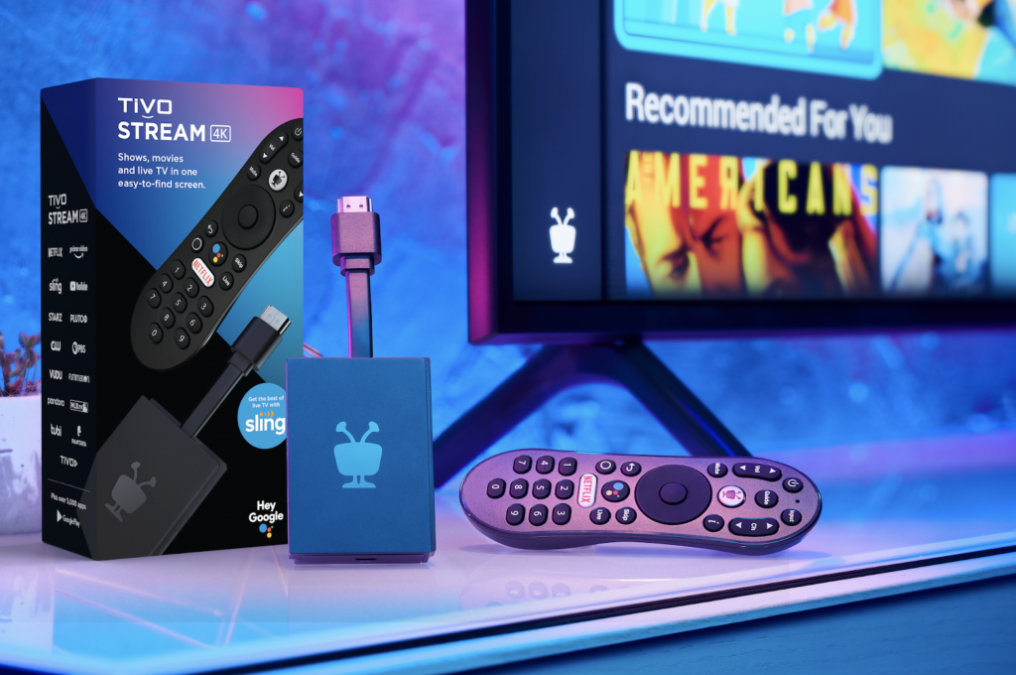TiVo Stream 4K-powered Smart TVs Coming in ‘Late 2021, Early 2022’
New parent company Xperi says streaming device is the TiVo’s fastest selling hardware product ever

The smarter way to stay on top of the streaming and OTT industry. Sign up below.
You are now subscribed
Your newsletter sign-up was successful
Still priced at the same introductory $50, streaming device TiVo Stream 4K is the company’s fastest selling hardware product ever, says new parent company Xperi Holdings.
Delivering its first quarterly earnings report since closing its $3 billion purchase of TiVo, Xperi laid out its vision for the Android TV-powered Stream 4K product, which Xperi CEO Jon Kirchner said is “launching a new chapter in the TiVo history.”
Also Read: TiVo Stream 4K: Everything You Need to Know About the New Android TV-Based Dongle
Kirchner didn’t disclose specific uptake numbers for Stream 4K, which streeted in May with a $50 introductory price that has been extended several times. (TiVo/Xperi said it would up the price to $75 on August 1, but it's still selling the device for $50.) For now, Xperi remains focused on expanding the device’s footprint. But ultimately, Xperi wants to use its expertise and connections in the smart TV industry to lift the device’s Stream OS into the global smart TV market.
“The second phase of this footprint expansion will come from the launch of Stream as an embedded search and discovery application for smart TVs expected to arrive in products in late 2021 or early 2022,” Kirchner said.
“In the third phase,” he added, “we will deliver Stream as a comprehensive smart TV platform connecting content from all sources and leveraging our search and discovery and monetization tools to fully exploit the TiVo content experience. This is one of the merger-related revenue synergies we are most excited about as we unite the TiVo Stream product with Xperi's very strong OEM relationships and TV footprint.”
The Product Mix
The smarter way to stay on top of the streaming and OTT industry. Sign up below.
The Stream 4K business fits into a "customer experience" category that accounts for about 40% - 45% of Xperi/TiVo’s products business. According to Kirchner, it includes, “audio imaging and ML-based solutions for the home and mobile markets from Xperi's portfolio along with the DVR hardware, streaming, metadata, and monetization solutions from TiVo's portfolio.”
Connected Car, another legacy Xperi category, accounts for 10% - 15% of the products business.
The pay TV business, which comes from the TiVo side, accounts for 45% - 50% of products revenue. According Kirchner, this category includes “ TiVo's Classic Guides, TiVo DVR, and its next-generation end-to-end platform which consists of our latest user interface, the user experience for and our IPTV cloud service.”
He said 12 U.S. pay TV operators are currently using that end-to-end solution, and that customer churn for the customers it’s deployed to is about 2% vs. an industry average of 4% - 5%.
“As we think about the Pay-TV category over the longer term, we expect it to remain an important contributor to overall revenue, while experiencing a modest slow decline in the near to mid-term,” Kirchner said. “However, it remains strategically important alongside our growing streaming footprint as it provides us with one of the largest video consumption consumer ecosystems.
The IP Side
TiVo was looking to split its products business from its IP licensing/patents operation before its courtship and subsequent corporate marriage to Xperi. But the deal has largely achieved that objective, Xperi said Monday.
Xperi Holdings is now managing a portfolio of 11,000 technology patents, generating $300 million in annual revenue, separating it from the TiVo-branded products business.
Upon closure of the merger, Xperi cast out TiVo’s top IP litigator, Arvin Patel, and several other top corporate lawyers.
But the company touted pay TV patent licensing deals with Verizon and CommScope, while expressing confidence that the latest favorable rulings by the International Trade Commission in its long-running battle with Comcast will finally bring the top U.S. cable company to heel.
“The patents at issue in the order cover key and widely used innovations generally relating to multi-room DVR and communication between multiple set-top boxes using MoCA technology. This is now our third favorable decision at the ITC against Comcast, and we believe this decision is particularly important in the context of our ongoing dispute,” Kirchner said.
Daniel Frankel is the managing editor of Next TV, an internet publishing vertical focused on the business of video streaming. A Los Angeles-based writer and editor who has covered the media and technology industries for more than two decades, Daniel has worked on staff for publications including E! Online, Electronic Media, Mediaweek, Variety, paidContent and GigaOm. You can start living a healthier life with greater wealth and prosperity by following Daniel on Twitter today!

